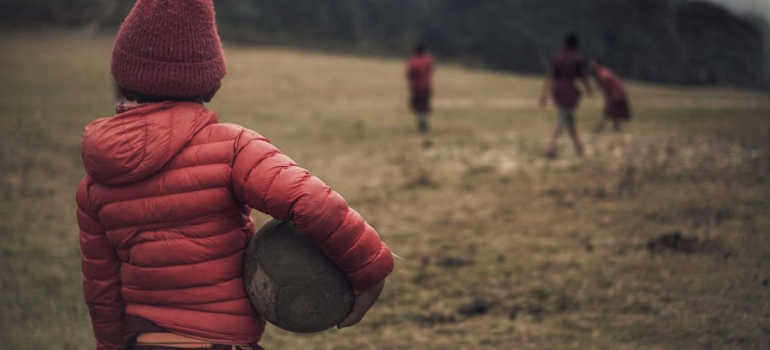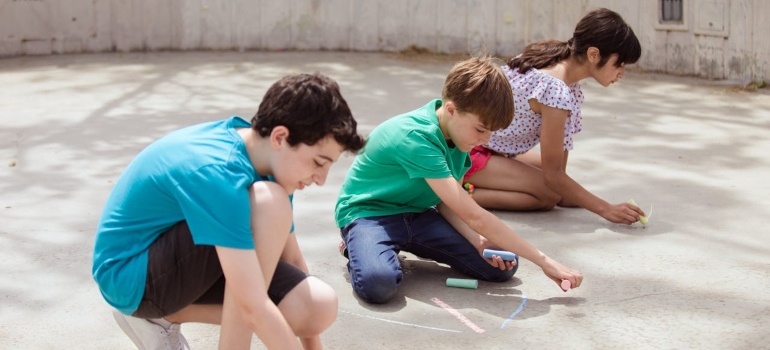Childhood trauma and adult addiction are deeply connected. Unfortunately, it is common that early negative experiences lay the foundation for later addictive behaviors. Childhood trauma includes a wide range of damaging experiences that can deeply affect a child’s emotional and psychological development. These traumas can manifest in different forms, including physical abuse and emotional neglect. Realizing the connection between childhood trauma and adult addiction is essential for developing effective prevention and treatment strategies. Harmony Ridge Recovery Center emphasizes recognizing these links in their treatment programs. By addressing the underlying trauma that contributes to addiction, Harmony Ridge Recovery Center provides an all-encompassing approach to recovery. Their trauma-informed care model ensures that people receive the support and therapy needed to heal from their past, get out of a vicious circle, and build a healthier future.
Forms of Childhood Trauma That Illustrate the Link Between Childhood Trauma and Adult Addiction
Any childhood trauma can have a lasting impact on an individual’s life. Some common types of childhood trauma are:
- Physical Abuse: Physical abuse involves hitting, beating, or causing other forms of bodily injury. This type of trauma can lead to extremely damaging physical and emotional scars that lead to adult addiction
- Emotional Neglect: Emotional neglect happens when a child’s emotional needs are consistently unmet. Therefore, that can lead to feelings of isolation, worthlessness, and insecurity.
- Household Dysfunction: Household dysfunction includes a range of negative conditions within the home. Those conditions could be living with parents who have addiction problems, mental illness, or are involved in criminal activities.
Each form of trauma can have a very negative effect on a child’s sense of safety and stability. Thus, it can lead them to increase the probability of developing emotional and psychological problems.

Childhood Trauma and Adult Addiction: Understanding Addiction as a Coping Mechanism
Addiction is often a coping mechanism for individuals struggling with unresolved childhood trauma. Once you start facing your troubles from the past, overwhelming pain and stress can wear you out. That is why, many people are becoming drug or alcohol addicts, as a way to numb their emotions and escape reality. This form of self-medication offers a brief relief but ultimately leads to a cycle of dependency and makes emotional troubles deeper. For instance, substances like alcohol and drugs can provide a strong sense of euphoria and numbness. Therefore, people experiencing those emotions might be able to forget their pain temporarily. Similarly, behaviors such as eating disorders or gambling can serve as distractions and offer a false sense of control. Still, these coping mechanisms are toxic and can significantly sabotage an individual’s ability to heal and lead a healthy life.
The Impact of Early Experienced Trauma on Brain Development
Unfortunately, the catastrophic consequences extend beyond emotional and psychological effects. Also, they can seriously affect brain development. During childhood, the brain is particularly vulnerable and sensitive to environmental influences. Trauma can change the brain’s structure and function. Moreover, it can lead to increased susceptibility to addiction later in life. Chronic exposure to stress can completely dysregulate the hypothalamic-pituitary-adrenal (HPA) axis, impair neurotransmitter systems, and hurt key brain regions like the prefrontal cortex and amygdala. These changes can damage an individual’s ability to manage stress, make healthy decisions, and regulate emotions effectively. All these changes can increase the probability of developing addictive behaviors as coping mechanisms. To handle these complex issues, comprehensive treatment approaches, including family therapy, are essential Family therapy can provide a safe space that addresses the dynamics contributing to the trauma and addiction, promoting healing for the individual and the family unit.
The Psychological Consequences of Childhood Trauma
Negative outcomes of childhood trauma are extensive. They can include a range of mental health issues such as depression, anxiety, and low self-esteem. Depression manifests as never-ending feelings of sadness and hopelessness and it often stems from unresolved trauma. Anxiety is characterized by excessive worry and fear, often triggered by reminders of traumatic experiences. Low self-esteem includes a diminished sense of self-worth and competence, often resulting from emotional neglect or sometimes even abuse. These psychological effects can greatly contribute to the development of addictive behaviors, as people often attempt to cope with their distress through substance misuse. For example, someone struggling with depression might use drugs or alcohol to temporarily lift their mood, while those with anxiety might start using them to relieve their tension. Addressing these co-occurring issues demands a comprehensive approach known as dual diagnosis that simultaneously treats both the addiction and the underlying mental health conditions.

Types of Addiction Linked to Childhood Trauma
Certain addictions are commonly linked to childhood trauma, reflecting different ways people attempt to cope with their past. Substance misuse, which includes addiction to alcohol, drugs, and prescription medications, is a regular coping mechanism for those seeking to escape emotional pain. For many, substances alleviate distressing emotions, though this relief comes at the cost of long-term health and wellness. Childhood trauma and gambling addiction also show a strong correlation. Compulsive gambling mostly serves as a distraction from traumatic memories, offering a false sense of control and adrenaline rush. This behavior allows individuals to momentarily escape their emotional troubles but ultimately leads to significant financial and personal consequences. In addition, eating disorders such as bulimia, anorexia, and binge eating can develop as individuals use food to manage their emotions and establish control over their lives.
Trauma Triggers and Substance Misuse
Trauma triggers are internal or external stimuli that cause memories of past trauma to resurface. Furthermore, that can lead to intense emotional and physiological reactions. For people with a history of childhood trauma and addiction, these triggers can cause cravings and relapse. Sensory reminders, such as certain sounds, smells, or sights related to the trauma, can provoke powerful emotional responses. Emotional states, including feelings of stress, anger, or loneliness often mirror the emotions experienced during the trauma. Situational reminders, like environments or circumstances that are similar to the traumatic event, can also lead to amplified anxiety and cravings. Identifying and managing these triggers is essential for preventing relapse and supporting long-term recovery. There is research that shows the importance of identifying these specific triggers to develop effective coping mechanisms. By correct identification, individuals can better manage their emotional responses and maintain their sobriety.

Behavioral Patterns and Coping Mechanisms
People who have experienced childhood trauma often develop particular behavioral patterns and coping mechanisms to manage their pain. These can include avoidance, where they isolate themselves from people, places, or activities that remind them of the trauma. Self-medication is unfortunately another common response, with individuals using substances or participating in addictive behaviors to numb their emotional pain. This temporary relief, however, often leads to prolonged problems and dependency. Risk-taking behaviors also emerge as people engage in dangerous or reckless activities, either as a means of self-punishment or distraction. These behaviors are often a foundation that leads to more significant health and social consequences. Identifying these patterns is crucial for developing efficient treatment strategies that address the root causes of addiction. By identifying and tackling the underlying trauma, treatment can help individuals adopt healthier coping mechanisms. Therapy, support groups, and other holistic approaches can play a crucial role in breaking these destructive cycles and cultivating long-term recovery.
Healing from Trauma Through Treatment
Effective treatment for people with histories of trauma and addiction often includes a mix of therapeutic approaches designed to tackle both issues at the same time. Key treatment modes include trauma-informed therapy, cognitive-behavioral therapy, and holistic approaches. Trauma-informed therapy recognizes the widespread impact of trauma and integrates this realization into all aspects of care. This approach creates a safe environment for healing, empowering addicts to regain control of their lives. Cognitive-behavioral therapy (CBT) is essential as it helps individuals identify and change negative thought patterns and behaviors related to trauma and addiction. CBT can be especially efficient in tackling the cognitive distortions that perpetuate addictive behaviors, offering tools to challenge and modify self-destructive beliefs. Holistic approaches address a person as a whole, tackling physical, emotional, and spiritual needs. Techniques such as mindfulness, yoga, meditation, and art therapy can be especially useful for trauma survivors, promoting overall well-being.

Prevention and Early Intervention
Early dealing with the issue and prevention strategies are essential for mitigating the long-term effects of childhood trauma. Also, if you deal with the problem on time, you are reducing the risk of developing addiction. Parental education plays a significant role in this effort, as educating parents about trauma effects and promoting positive parenting practices can stop childhood trauma from happening. By equipping parents with the skills and knowledge to create supportive and nurturing environments, the probability of trauma-related issues can be greatly reduced. School-based programs also add to prevention by teaching children emotional regulation, resilience, and healthy coping skills. Early access to these services can help identify and tackle trauma before it escalates into more severe issues. Furthermore, implementing relapse prevention strategies into these early interventions can provide ongoing support that will prevent the recurrence of addictive behaviors.
Group Therapy as One of the Most Efficient Tools for Dealing with Childhood Trauma and Addiction
The connection between substance abuse and childhood trauma is very complex as many use substances to cope with the emotional pain of their early experiences. Group therapy and sharing can play a pivotal role in tackling addiction that stems from childhood trauma. In a group therapy setting, people find a supportive community where they can openly share their experiences without fear of judgment. This mutual sharing cultivates a sense of belonging and understanding, which is essential for those who have felt isolated by their trauma. Hearing others’ stories can be incredibly healing and can help individuals recognize that they are not alone. Group therapy also provides a platform for learning new coping strategies and building resilience, as members share proper tools and insights that have helped them manage their addiction, trauma, and emotional distress.

Community Resources
Support groups and community resources play an essential role in supporting people affected by childhood trauma and addiction. Organizations like Alcoholics Anonymous (AA) and Narcotics Anonymous (NA) offer peer support and a sense of community for those recovering from drug and alcohol addiction. Therapy and counseling services are also important, providing professional mental health care to address both addiction and trauma. Access to expert therapists can help individuals process their traumatic experiences and create healthier coping mechanisms. Nonprofit organizations, such as the National Association for Children of Addiction (NACoA) and Childhelp, offer valuable resources and also support for families affected by childhood trauma and addiction. These organizations provide advocacy, educational materials, and support groups. They do that by helping to raise awareness and foster resilience in addicts.

Addressing Childhood Trauma and Adult Addiction for Effective Recovery and Prevention
All in all, understanding the connection between childhood trauma and adult addiction is vital for developing effective prevention and treatment strategies. By addressing the different forms of childhood trauma, identifying addiction as a coping mechanism, and acknowledging the impact of early negative events on brain development, we can better support those affected by these issues. Through all-encompassing treatment, early intervention, and community support, people can heal from their past and build a better future. By fostering empathy and challenging prejudices, we can support those affected by childhood trauma and adult addiction on their path to recovery and resilience.
Reference:
https://www.ncbi.nlm.nih.gov/pmc/articles/PMC3051362/



